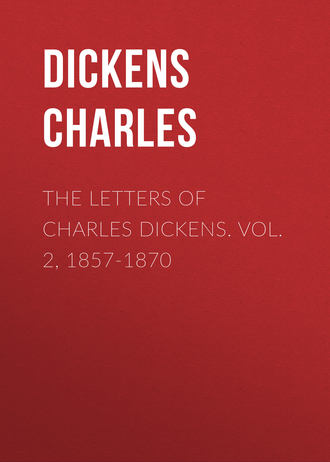
Чарльз Диккенс
The Letters of Charles Dickens. Vol. 2, 1857-1870
All join in kindest love to your dear sister and all the rest.
Ever, my dearest Macready,Most affectionately yours.
Mr. Edmund Yates
Tavistock House, Sunday, July 19th, 1857.
My dear Yates,
Although I date this ashore, I really write it from Southampton (don't notice this fact in your reply, for I shall be in town on Wednesday). I have come here on an errand which will grow familiar to you before you know that Time has flapped his wings over your head. Like me, you will find those babies grow to be young men before you are quite sure they are born. Like me, you will have great teeth drawn with a wrench, and will only then know that you ever cut them. I am here to send Walter away over what they call, in Green Bush melodramas, "the Big Drink," and I don't at all know this day how he comes to be mine, or I his.
I don't write to say this – or to say how seeing Charley, and he going aboard the ship before me just now, I suddenly came into possession of a photograph of my own back at sixteen and twenty, and also into a suspicion that I had doubled the last age. I merely write to mention that Telbin and his wife are going down to Gad's Hill with us, about mid-day next Sunday, and that if you and Mrs. Yates will come too, we shall be delighted to have you. We can give you a bed, and you can be in town (if you have such a savage necessity) by twenty minutes before ten on Monday morning.
I was very much pleased (as I had reason to be) with your account of the reading in The Daily News. I thank you heartily.
Mr. T. P. Cooke
IN REMEMBRANCE OF THE LATE MR. DOUGLAS JERROLD
Committee's Office, Gallery of Illustration,Regent Street, Thursday, July 30th, 1857.
My dear Mr. Cooke,
I cannot rest satisfied this morning without writing to congratulate you on your admirable performance of last night. It was so fresh and vigorous, so manly and gallant, that I felt as if it splashed against my theatre-heated face along with the spray of the breezy sea. What I felt everybody felt; I should feel it quite an impertinence to take myself out of the crowd, therefore, if I could by any means help doing so. But I can't; so I hope you will feel that you bring me on yourself, and have only yourself to blame.
Always faithfully yours.
Mrs. Compton
Gad's Hill Place, Higham by Rochester,Sunday Night, Aug 2nd, 1857.
My dear Mrs. Compton,
We are going to play "The Frozen Deep" (pursuant to requisition from town magnates, etc.) at Manchester, at the New Free Trade Hall, on the nights of Friday and Saturday, the 21st and 22nd August.
The place is out of the question for my girls. Their action could not be seen, and their voices could not be heard. You and I have played, there and elsewhere, so sociably and happily, that I am emboldened to ask you whether you would play my sister-in-law Georgina's part (Compton and babies permitting).
We shall go down in the old pleasant way, and shall have the Art Treasures Exhibition to ourselves on the Sunday; when even "he" (as Rogers always called every pretty woman's husband) might come and join us.
What do you say? What does he say? and what does baby say? When I use the term "baby," I use it in two tenses – present and future.
Answer me at this address, like the Juliet I saw at Drury Lane – when was it? – yesterday. And whatever your answer is, if you will say that you and Compton will meet us at the North Kent Station, London Bridge, next Sunday at a quarter before one, and will come down here for a breath of sweet air and stay all night, you will give your old friends great pleasure. Not least among them,
Yours faithfully.
Mr. W. C. Macready
Gad's Hill Place, Higham by Rochester,Monday, Aug. 3rd, 1857.
My dearest Macready,
I write to you in reference to your last note, as soon as I positively know our final movements in the Jerrold matter.
We are going to wind up by acting at Manchester (on solemn requisition) on the evenings of Friday and Saturday, the 21st and 22nd (actresses substituted for the girls, of course). We shall have to leave here on the morning of the 20th. You thought of coming on the 16th; can't you make it a day or two earlier, so as to be with us a whole week? Decide and pronounce. Again, cannot you bring Katey with you? Decide and pronounce thereupon, also.
I read at Manchester last Friday. As many thousand people were there as you like to name. The collection of pictures in the Exhibition is wonderful. And the power with which the modern English school asserts itself is a very gratifying and delightful thing to behold. The care for the common people, in the provision made for their comfort and refreshment, is also admirable and worthy of all commendation. But they want more amusement, and particularly (as it strikes me) something in motion, though it were only a twisting fountain. The thing is too still after their lives of machinery, and art flies over their heads in consequence.
I hope you have seen my tussle with the "Edinburgh." I saw the chance last Friday week, as I was going down to read the "Carol" in St. Martin's Hall. Instantly turned to, then and there, and wrote half the article. Flew out of bed early next morning, and finished it by noon. Went down to Gallery of Illustration (we acted that night), did the day's business, corrected the proofs in Polar costume in dressing-room, broke up two numbers of "Household Words" to get it out directly, played in "Frozen Deep" and "Uncle John," presided at supper of company, made no end of speeches, went home and gave in completely for four hours, then got sound asleep, and next day was as fresh as you used to be in the far-off days of your lusty youth.
All here send kindest love to your dear good sister and all the house.
Ever and ever affectionately.
Mr. Frank Stone, A.R.A
Tavistock House, Sunday Afternoon, Aug. 9th, 1857.
My dear Stone,
Now here, without any preface, is a good, confounding, stunning question for you – would you like to play "Uncle John" on the two nights at Manchester?
It is not a long part. You could have a full rehearsal on the Friday, and I could sit in the wing at night and pull you through all the business. Perhaps you might not object to being in the thing in your own native place, and the relief to me would be enormous.
This is what has come into my head lying in bed to-day (I have been in bed all day), and this is just my plain reason for writing to you.
It's a capital part, and you are a capital old man. You know the play as we play it, and the Manchester people don't. Say the word, and I'll send you my own book by return of post.
The agitation and exertion of Richard Wardour are so great to me, that I cannot rally my spirits in the short space of time I get. The strain is so great to make a show of doing it, that I want to be helped out of "Uncle John" if I can. Think of yourself far more than me; but if you half think you are up to the joke, and half doubt your being so, then give me the benefit of the doubt and play the part.
Answer me at Gad's Hill.
Ever affectionately.
P.S. – If you play, I shall immediately announce it to all concerned. If you don't, I shall go on as if nothing had happened, and shall say nothing to anyone.
Mr. Henry Austin
Gad's Hill Place, Saturday, Aug. 15th, 1857.
My dear Henry,
At last, I am happy to inform you, we have got at a famous spring!! It rushed in this morning, ten foot deep. And our friends talk of its supplying "a ton a minute for yourself and your family, sir, for nevermore."
They ask leave to bore ten feet lower, to prevent the possibility of what they call "a choking with sullage." Likewise, they are going to insert "a rose-headed pipe;" at the mention of which implement, I am (secretly) well-nigh distracted, having no idea of what it means. But I have said "Yes," besides instantly standing a bottle of gin. Can you come back, and can you get down on Monday morning, to advise and endeavour to decide on the mechanical force we shall use for raising the water? I would return with you, as I shall have to be in town until Thursday, and then to go to Manchester until the following Tuesday.
I send this by hand to John, to bring to you.
Ever affectionately.
Mr. Frank Stone, A.R.A
Gad's Hill Place, Monday, Aug. 17th, 1857.
My dear Stone,
I received your kind note this morning, and write this reply here to take to London with me and post in town, being bound for that village and three days' drill of the professional ladies who are to succeed the Tavistock girls.
My book I enclose. There is a slight alteration (which does not affect you) at the end of the first act, in order that the piece may be played through without having the drop curtain down. You will not find the situations or business difficult, with me on the spot to put you right.
Now, as to the dress. You will want a pair of pumps, and a pair of white silk socks; these you can get at Manchester. The extravagantly and anciently-frilled shirts that I have had got up for the part, I will bring you down; large white waistcoat, I will bring you down; large white hat, I will bring you down; dressing-gown, I will bring you down; white gloves and ditto choker you can get at Manchester. There then remain only a pair of common nankeen tights, to button below the calf, and blue wedding-coat. The nankeen tights you had best get made at once; my "Uncle John" coat I will send you down in a parcel by to-morrow's train, to have altered in Manchester to your shape and figure. You will then be quite independent of Christian chance and Jewish Nathan, which latter potentate is now at Canterbury with the cricket amateurs, and might fail.
A Thursday's rehearsal is (unfortunately) now impracticable, the passes for the railway being all made out, and the company's sailing orders issued. But, as I have already suggested, with a careful rehearsal on Friday morning, and with me at the wing at night to put you right, you will find yourself sliding through it easily. There is nothing in the least complicated in the business. As to the dance, you have only to knock yourself up for a twelvemonth and it will go nobly.
After all, too, if you should, through any unlucky breakdown, come to be afraid of it, I am no worse off than I was before, if I have to do it at last. Keep your pecker up with that.
I am heartily obliged to you, my dear old boy, for your affectionate and considerate note, and I wouldn't have you do it, really and sincerely – immense as the relief will be to me – unless you are quite comfortable in it, and able to enjoy it.
Ever affectionately.
Mr. Frank Stone, A.R.A
Office of "Household Words," Tuesday, Aug. 18th, 1857.
My dear Stone,
I sent you a telegraph message last night, in total contradiction of the letter you received from me this morning.
The reason was simply this: Arthur Smith and the other business men, both in Manchester and here, urged upon me, in the strongest manner, that they were afraid of the change; that it was well known in Manchester that I had done the part in London; that there was a danger of its being considered disrespectful in me to give it up; also that there was a danger that it might be thought that I did so at the last minute, after an immense let, whereas I might have done it at first, etc. etc. etc. Having no desire but for the success of our object, and a becoming recognition on my part of the kind Manchester public's cordiality, I gave way, and thought it best to go on.
I do so against the grain, and against every inclination, and against the strongest feeling of gratitude to you. My people at home will be miserable too when they hear I am going to do it. If I could have heard from you sooner, and got the bill out sooner, I should have been firmer in considering my own necessity of relief. As it is, I sneak under; and I hope you will feel the reasons, and approve.
Ever affectionately.
Mr. Henry Austin
Gad's Hill Place, Wednesday, Sept. 2nd, 1857.
My dear Henry,
The second conspirator has been here this morning to ask whether you wish the windlass to be left in the yard, and whether you will want him and his mate any more, and, if so, when? Of course he says (rolling something in the form of a fillet in at one broken tooth all the while, and rolling it out at another) that they could wish fur to have the windlass if it warn't any ways a hill conwenience fur to fetch her away. I have told him that if he will come back on Friday he shall have your reply. Will you, therefore, send it me by return of post? He says he'll "look up" (as if he was an astronomer) "a Friday arterdinner."
On Monday I am going away with Collins for ten days or a fortnight, on a "tour in search of an article" for "Household Words." We have not the least idea where we are going; but he says, "Let's look at the Norfolk coast," and I say, "Let's look at the back of the Atlantic." I don't quite know what I mean by that; but have a general impression that I mean something knowing.
I am horribly used up after the Jerrold business. Low spirits, low pulse, low voice, intense reaction. If I were not like Mr. Micawber, "falling back for a spring" on Monday, I think I should slink into a corner and cry.
Ever affectionately.
Miss Hogarth
Allonby, Cumberland, Wednesday Night, Sept. 9th, 1857.
My dear Georgy,
* * * * * *
Think of Collins's usual luck with me! We went up a Cumberland mountain yesterday – a huge black hill, fifteen hundred feet high. We took for a guide a capital innkeeper hard by. It rained in torrents – as it only does rain in a hill country – the whole time. At the top, there were black mists and the darkness of night. It then came out that the innkeeper had not been up for twenty years, and he lost his head and himself altogether; and we couldn't get down again! What wonders the Inimitable performed with his compass until it broke with the heat and wet of his pocket no matter; it did break, and then we wandered about, until it was clear to the Inimitable that the night must be passed there, and the enterprising travellers probably die of cold. We took our own way about coming down, struck, and declared that the guide might wander where he would, but we would follow a watercourse we lighted upon, and which must come at last to the river. This necessitated amazing gymnastics; in the course of which performances, Collins fell into the said watercourse with his ankle sprained, and the great ligament of the foot and leg swollen I don't know how big.
How I enacted Wardour over again in carrying him down, and what a business it was to get him down; I may say in Gibbs's words: "Vi lascio a giudicare!" But he was got down somehow, and we got off the mountain somehow; and now I carry him to bed, and into and out of carriages, exactly like Wardour in private life. I don't believe he will stand for a month to come. He has had a doctor, and can wear neither shoe nor stocking, and has his foot wrapped up in a flannel waistcoat, and has a breakfast saucer of liniment, and a horrible dabbling of lotion incessantly in progress. We laugh at it all, but I doubt very much whether he can go on to Doncaster. It will be a miserable blow to our H. W. scheme, and I say nothing about it as yet; but he is really so crippled that I doubt the getting him there. We have resolved to fall to work to-morrow morning and begin our writing; and there, for the present, that point rests.
This is a little place with fifty houses, five bathing-machines, five girls in straw hats, five men in straw hats, and no other company. The little houses are all in half-mourning – yellow stone on white stone, and black; and it reminds me of what Broadstairs might have been if it had not inherited a cliff, and had been an Irishman. But this is a capital little homely inn, looking out upon the sea; and we are really very comfortably lodged. I can just stand upright in my bedroom. Otherwise, it is a good deal like one of Ballard's top-rooms. We have a very obliging and comfortable landlady; and it is a clean nice place in a rough wild country. We came here haphazard, but could not have done better.
We lay last night at a place called Wigton – also in half-mourning – with the wonderful peculiarity that it had no population, no business, no streets to speak of; but five linendrapers within range of our small windows, one linendraper's next door, and five more linendrapers round the corner. I ordered a night-light in my bedroom. A queer little old woman brought me one of the common Child's night-lights, and seeming to think that I looked at it with interest, said: "It's joost a vara keeyourious thing, sir, and joost new coom oop. It'll burn awt hoors a' end, an no gootther, nor no waste, nor ony sike a thing, if you can creedit what I say, seein' the airticle."
Of course I shall go to Doncaster, whether or no (please God), and my postage directions to you remain unchanged. Love to Mamey, Katey, Charley, Harry, and the darling Plorn.
Ever affectionately.
Miss Hogarth
Lancaster, Saturday Night, Sept. 12th, 1857.
My dear Georgy,
I received your letter at Allonby yesterday, and was delighted to get it. We came back to Carlisle last night (to a capital inn, kept by Breach's brother), and came on here to-day. We are on our way to Doncaster; but Sabbath observance throws all the trains out; and although it is not a hundred miles from here, we shall have, as well as I can make out the complicated lists of trains, to sleep at Leeds – which I particularly detest as an odious place – to-morrow night.
Accustomed as you are to the homage which men delight to render to the Inimitable, you would be scarcely prepared for the proportions it assumes in this northern country. Station-masters assist him to alight from carriages, deputations await him in hotel entries, innkeepers bow down before him and put him into regal rooms, the town goes down to the platform to see him off, and Collins's ankle goes into the newspapers!!!
It is a great deal better than it was, and he can get into new hotels and up the stairs with two thick sticks, like an admiral in a farce. His spirits have improved in a corresponding degree, and he contemplates cheerfully the keeping house at Doncaster. I thought (as I told you) he would never have gone there, but he seems quite up to the mark now. Of course he can never walk out, or see anything of any place. We have done our first paper for H. W., and sent it up to the printer's.
The landlady of the little inn at Allonby lived at Greta Bridge, in Yorkshire, when I went down there before "Nickleby," and was smuggled into the room to see me, when I was secretly found out. She is an immensely fat woman now. "But I could tuck my arm round her waist then, Mr. Dickens," the landlord said when she told me the story as I was going to bed the night before last. "And can't you do it now," I said, "you insensible dog? Look at me! Here's a picture!" Accordingly, I got round as much of her as I could; and this gallant action was the most successful I have ever performed, on the whole. I think it was the dullest little place I ever entered; and what with the monotony of an idle sea, and what with the monotony of another sea in the room (occasioned by Collins's perpetually holding his ankle over a pail of salt water, and laving it with a milk jug), I struck yesterday, and came away.
We are in a very remarkable old house here, with genuine old rooms and an uncommonly quaint staircase. I have a state bedroom, with two enormous red four-posters in it, each as big as Charley's room at Gad's Hill. Bellew is to preach here to-morrow. "And we know he is a friend of yours, sir," said the landlord, when he presided over the serving of the dinner (two little salmon trout; a sirloin steak; a brace of partridges; seven dishes of sweets; five dishes of dessert, led off by a bowl of peaches; and in the centre an enormous bride-cake – "We always have it here, sir," said the landlord, "custom of the house.") (Collins turned pale, and estimated the dinner at half a guinea each.)
This is the stupidest of letters, but all description is gone, or going, into "The Lazy Tour of Two Idle Apprentices."
Kiss the darling Plorn, who is often in my thoughts. Best love to Charley, Mamey, and Katie. I will write to you again from Doncaster, where I shall be rejoiced to find another letter from you.
Ever affectionately, my dearest Georgy.
Miss Hogarth
Angel Hotel, Doncaster, Tuesday, Sept. 15th, 1857.
My dear Georgy,
I found your letter here on my arrival yesterday. I had hoped that the wall would have been almost finished by this time, and the additions to the house almost finished too – but patience, patience!
We have very good, clean, and quiet apartments here, on the second floor, looking down into the main street, which is full of horse jockeys, bettors, drunkards, and other blackguards, from morning to night – and all night. The races begin to-day and last till Friday, which is the Cup Day. I am not going to the course this morning, but have engaged a carriage (open, and pair) for to-morrow and Friday.
"The Frozen Deep's" author gets on as well as could be expected. He can hobble up and down stairs when absolutely necessary, and limps to his bedroom on the same floor. He talks of going to the theatre to-night in a cab, which will be the first occasion of his going out, except to travel, since the accident. He sends his kind regards and thanks for enquiries and condolence. I am perpetually tidying the rooms after him, and carrying all sorts of untidy things which belong to him into his bedroom, which is a picture of disorder. You will please to imagine mine, airy and clean, little dressing-room attached, eight water-jugs (I never saw such a supply), capital sponge-bath, perfect arrangement, and exquisite neatness. We breakfast at half-past eight, and fall to work for H. W. afterwards. Then I go out, and – hem! look for subjects.
The mayor called this morning to do the honours of the town, whom it pleased the Inimitable to receive with great courtesy and affability. He propounded invitation to public déjeûner, which it did not please the Inimitable to receive, and which he graciously rejected.
That's all the news. Everything I can describe by hook or by crook, I describe for H. W. So there is nothing of that sort left for letters.
Best love to dear Mamey and Katey, and to Charley, and to Harry. Any number of kisses to the noble Plorn.
Ever affectionately.
Mr. Arthur Ryland
Gad's Hill Place, Saturday Evening, Oct. 3rd, 1857.
My dear Sir,
I have had the honour and pleasure of receiving your letter of the 28th of last month, informing me of the distinction that has been conferred upon me by the Council of the Birmingham and Midland Institute.
Allow me to assure you with much sincerity, that I am highly gratified by having been elected one of the first honorary members of that establishment. Nothing could have enhanced my interest in so important an undertaking; but the compliment is all the more welcome to me on that account.
I accept it with a due sense of its worth, with many acknowledgments and with all good wishes.
I am ever, my dear Sir, very faithfully yours.
Mr. Edmund Yates
Tavistock House, Monday Night, Nov. 16th, 1857.
My dear Yates,
I retain the story with pleasure; and I need not tell you that you are not mistaken in the last lines of your note.
Excuse me, on that ground, if I say a word or two as to what I think (I mention it with a view to the future) might be better in the paper. The opening is excellent. But it passes too completely into the Irishman's narrative, does not light it up with the life about it, or the circumstances under which it is delivered, and does not carry through it, as I think it should with a certain indefinable subtleness, the thread with which you begin your weaving. I will tell Wills to send me the proof, and will try to show you what I mean when I shall have gone over it carefully.
Faithfully yours always.
Mr. Frank Stone, A.R.A
Tavistock House, Wednesday, Dec. 13th, 1857.
My dear Stone,
I find on enquiry that the "General Theatrical Fund" has relieved non-members in one or two instances; but that it is exceedingly unwilling to do so, and would certainly not do so again, saving on some very strong and exceptional case. As its trustee, I could not represent to it that I think it ought to sail into those open waters, for I very much doubt the justice of such cruising, with a reference to the interests of the patient people who support it out of their small earnings.
Affectionately ever.







